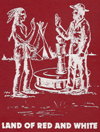 I REMEMBER BILLY
I REMEMBER BILLY
by Fred Granger
It is written in my mother's diary that William McCormick first visited at our place on October 4, 1911. He came that day to buy oat sheaves. He, with his son Billy had come west from Ontario after his wife passed away. He was a blacksmith by trade. In 1911 he was living on a farm in the Mooswa district. Billy Jr. filed a homestead on the quarter section east of Mooswa, where Harry Blacklock is currently living.
Around 1915 William left Mooswa and moved on N.W. 10-55-4-W4th in the Heinsburg district. My first memory of him is that of a middle-aged man with greying hair and a big mustache that he was very proud of. We called him "Old Billy" and his son "Young Billy."
I can't remember if the buildings were there when he moved onto "ten", but there was quite a settlement of people with a German background on land surrounding his farm. Old Billy did some farming and earned a fair amount of money by blacksmith work for the neighbors and during the hard winter of 1918-19 he sold oat sheaves for 50 cents per sheaf - and the buyer had to dig them out of the deep snow in the field. That was the year that winter began on 7th of October and snow never went away until sometime in May. Many crops in the district weren't stooked much less threshed and some were not even cut. Billy and others who didn't mind charging a high price for feed made a pretty fair living as they, themselves, had only a few head of horses to feed. In the spring of 1919 he lost his stable, harness, blacksmith tools and almost everything he owned, except his house, in a fire that destroyed much of that corner of the district. Young Billy, who was a cook by trade and never had any difficulty finding a job, kept his father supplied with enough cash to live on.
I have heard it said that Old Billy was considered to be anti-social, but we found him quite a friendly person who at times showed a sense of humor, such as when I first tried to grow a mustache. I proudly showed it to him, he squinted at the dark line across my upper lip, and asked me if I would like a pup off his. Another time before the roof was put on our barn, my little sister climbed up onto what was intended to be the floor of the loft. Oat sheaves were stacked up there and she fell through the trap door that was used to drop the sheaves down at feeding time. Old Billy's pinto horse was tied in the stall below; Dad and Old Billy were standing beside him. She landed on the pinto, bounced off it into Old Billy's arms, knocked out cold. As he headed for the house with her in his arms he muttered that those durn kids would kill him off yet. Luckily sis wasn't hurt much.
He made a point of coming to our place around meal time, and was always asked to stop and eat. He invariably pulled a chair close to the cook stove to soak up its friendly heat and Mom and the girls worked around him; even after one of the girls accidently dropped the rolling pin on his head, that was still his favorite place, and Mom's good home cooking was enticing enough that he still kept coming at least once a week.
I think it was in the mid-twenties when he left the farm and moved into Lindbergh where he lived until he was in his nineties and passed away there. He may have been, as I am now, one of those old bachelors too numerous to mention but we really enjoyed his company and missed him a lot after he left the district.


